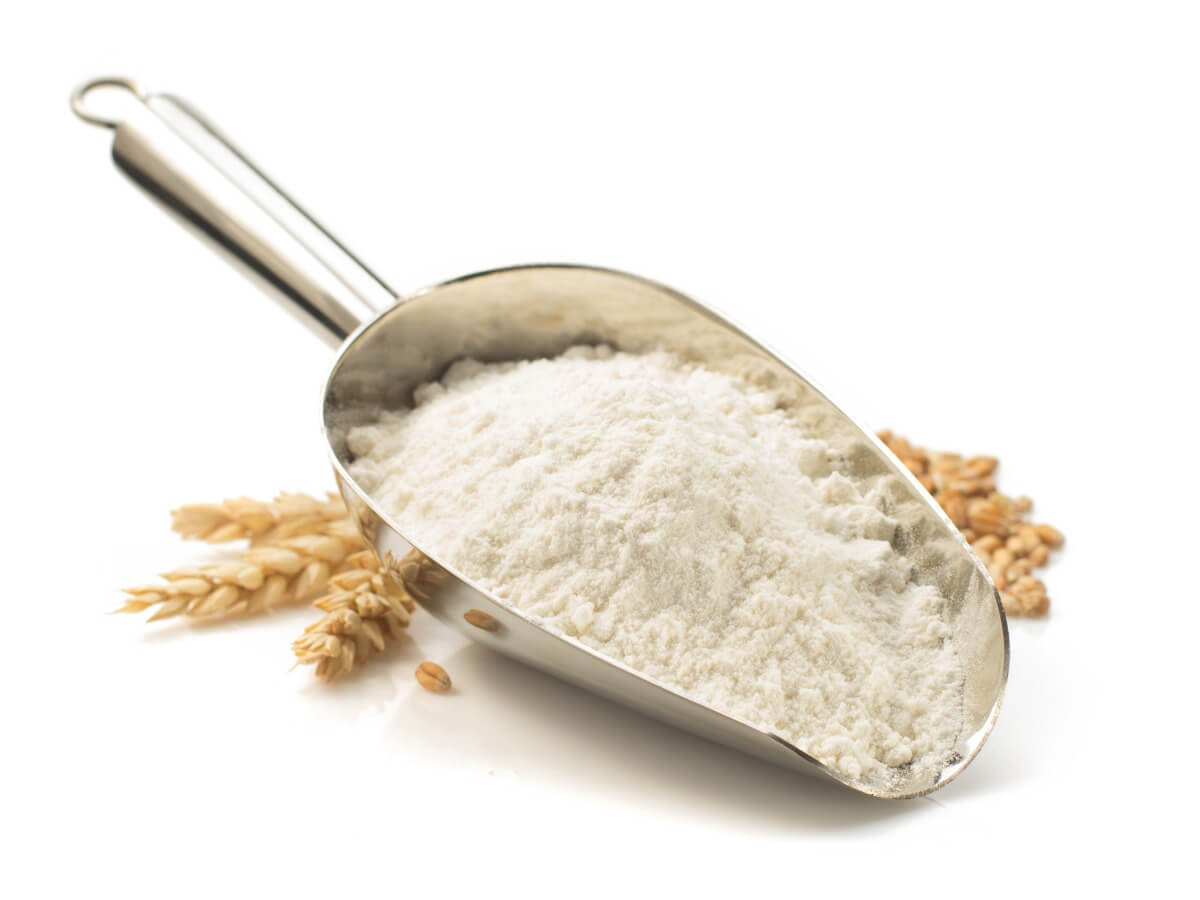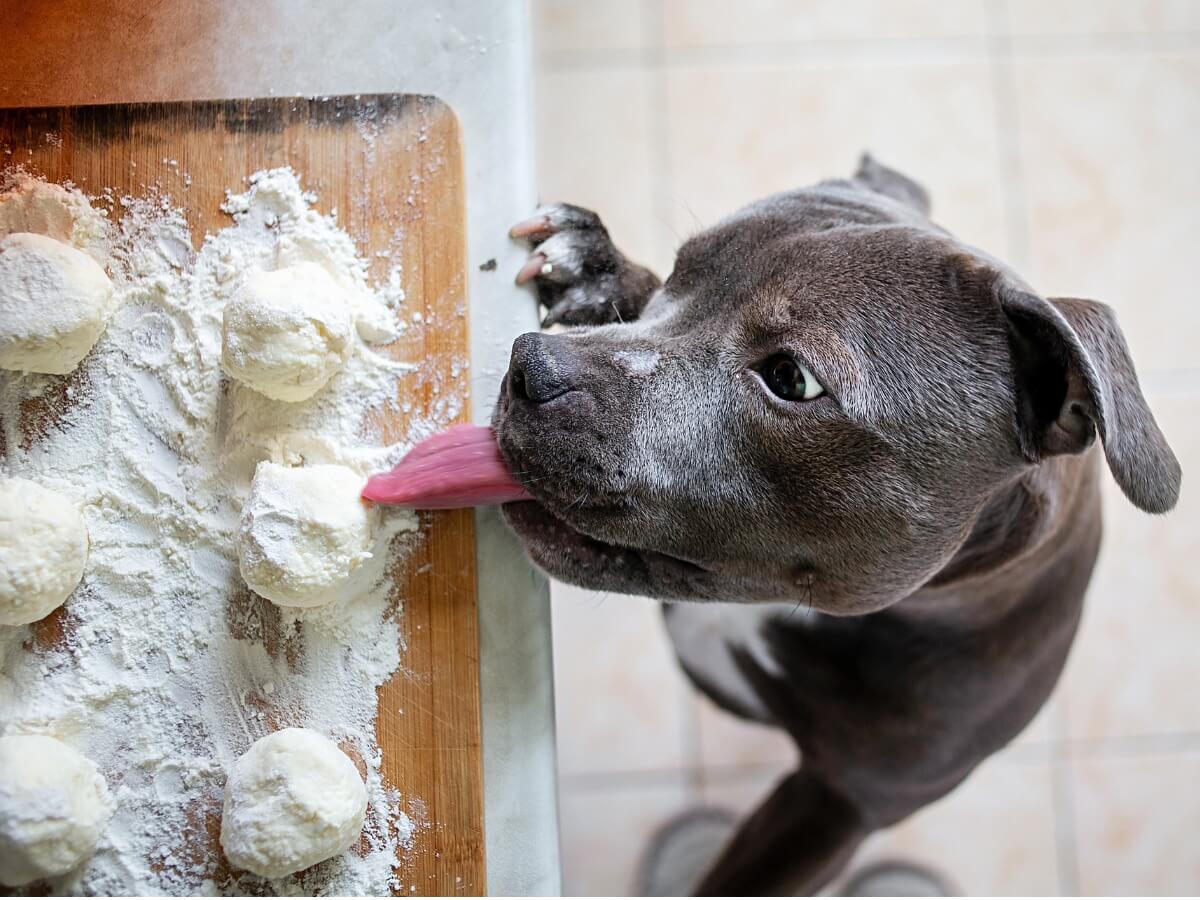Can Dogs Eat Wheat Flour?
Wheat-based flour contains a high percentage of starch. Find out if this ingredient has enough benefits to make it part of your dog's diet.

Feeding dogs is a fundamental and influential aspect that influences the quality of life of these animals. In order to find a balanced diet that benefits their body, you’ll need to review what foods or ingredients provide enough nutrients for them. Hence the question arises: can dogs eat wheat flour?
To know exactly what foods contribute positively or negatively to the life of a canine, it’s advisable to visit a veterinarian. Through checks, the vet will know whether it’s a good idea to remove any elements from their diet, including wheat flour. It’s important to diagnose if the dog has allergic reactions in time, or to find out if they’re suffering from a disease due to their diet.
Components of wheat flour
Wheat flour is a common ingredient in many people’s daily diet, especially in cakes, cookies, and other baked goods. However, as with all food, the fact that it doesn’t affect humans doesn’t mean that it acts in the same way in dogs.
Some flours are made up of the 3 parts of the wheat grain. These are the endosperm —which contains protein and starch—, the germ —which is the part that’s rich in proteins, fats and vitamins— and also the bran or the fiber part of the wheat. Fiber is essential in many omnivorous and herbivorous living beings, as it helps maintain the intestinal microbiota.
However, white or refined wheat flour is made solely from endosperm. This means that it contains fewer nutrients than other wheat derivatives, such as whole wheat flour.

Is it bad for dogs to eat wheat flour?
Despite being a pleasant ingredient in several recipes, white wheat flour undergoes very obvious processing and lacks several components that benefit dogs, such as vitamins, proteins and minerals. In addition, this flour has approximately 80% starch, a component that facilitates weight gain and could cause digestion problems in canines.
Although from time to time you can give your dog food that contains wheat flour, causing the canine to ingest this product in excess can be harmful. Above all, it should be avoided if it’s accompanied by sugar in items such as cookies, sweets or cakes. Including large amounts of wheat flour in the dog’s diet can cause it to become obese and have poor health.
So can dogs eat wheat flour? The simplest answer is “yes”, as long as they don’t have a wheat allergy or some other bad reaction. However, it isn’t the best option for feeding your dog. This flour lacks nutrients that provide very obvious benefits to their bodies, and so it’s better to avoid it.
Other flours
On the other hand, although wheat flour composed only of endosperm isn’t the most nutritious option to feed to dogs, there are other variants that contain vitamins and proteins to positively influence the health of canines. The following alternatives can make a difference in the supply of nutrients that your dog obtains through food:
- Whole wheat flour: This contains fiber, proteins, vitamins and minerals, because, unlike white or refined wheat flour, whole wheat flour is made from the 3 parts of the wheat grain. That is, endosperm, germ, and bran.
- Almond flour: This is obtained by grinding almond nuts into a powder. This flour is very rich in protein, but it also has fiber, copper, phosphorus and other important minerals for the body of dogs.
- Coconut flour: This type of flour is the result of grinding the coconut pulp into a powder that’s rich in vegetable proteins and fibers. In addition, it’s a good option because it doesn’t contain gluten, a component that can cause problems in some dogs.
- Oatmeal: This is made by grinding oats into a fine powder. It’s a good option when baking cookies or making other types of treats for dogs, as it’s rich in antioxidants, vitamins, and minerals. Also, this variant doesn’t contain gluten and is low in sugar.

Final thoughts
In conclusion, although wheat flour isn’t a harmful product for dogs, there are better and healthier alternatives when it comes to providing a rich and balanced diet. In addition, according to the American Animal Hospital Association (AAHA), it’s also important to take into account specific aspects such as age, physiological status, and the pet’s activity, in order to evaluate whether its diet is adequate or not.
Remember that the diet you provide your dog will either positively or negatively influence its health. Because of this, you should avoid feeding it with foods that don’t provide the necessary nutrients to its body. In the same way, don’t forget that with the help of a veterinarian you’ll be able to evaluate your dog’s development at a nutritional level and thus determine if it’s adequate or not.

